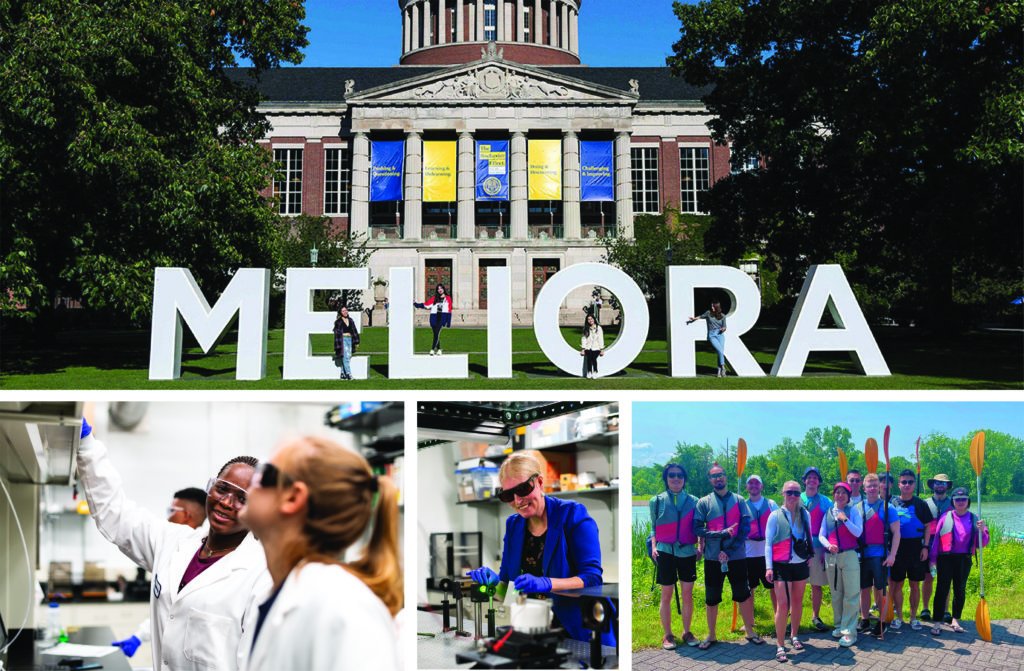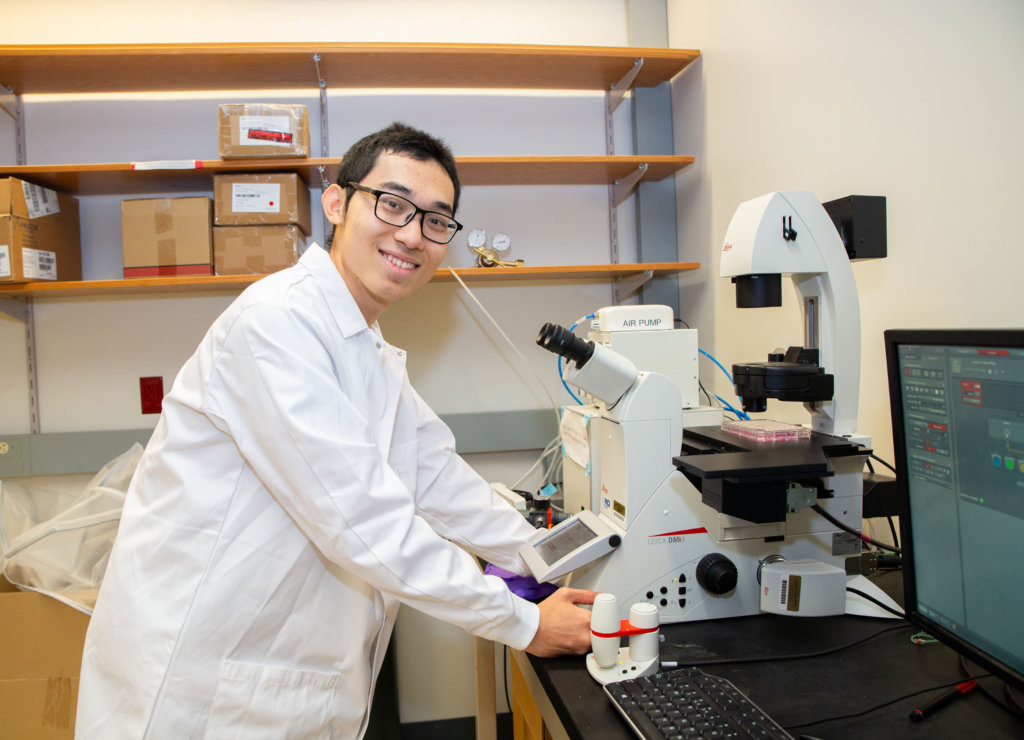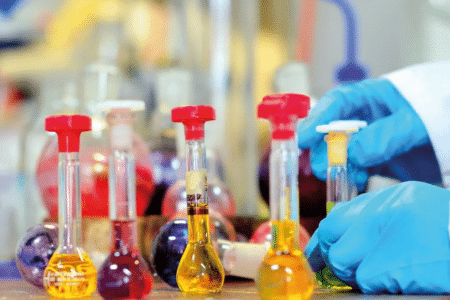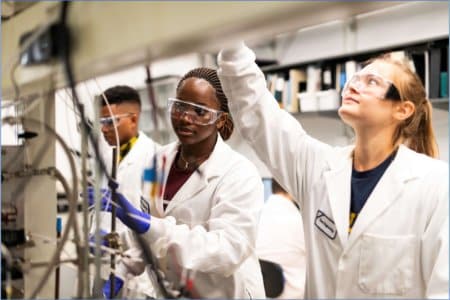
A changing world calls for more chemical engineers to step up. There is an ever-growing demand for new technologies, environmentally-friendly solutions and cutting-edge materials. More advanced knowledge, skills and experience are necessary — the degrees of yesterday are no longer sufficient for chemical engineers to drive innovation.
Whether designing cleaner energy sources, improving pharmaceuticals or developing sustainable food production, there are as many intellectual challenges and professional opportunities ahead. To seize them and create impact in this discipline, start with a postgraduate degree from the following universities.

Research Informs MS and PhD programmes at the University of Rochester’s Department of Chemical Engineering. Source: University of Rochester
University of Rochester, Department of Chemical Engineering
Located in New York’s third-largest metropolitan area that’s welcoming, friendly and affordable, the University of Rochester’s Department of Chemical Engineering (ChE) was established in 1915 as one of the first chemical engineering programmes in the country. Today, ChE is known for cutting-edge, well-funded research in sustainability, advanced materials, bioengineering, computational modelling, and machine learning. Spanning technologies, materials and processes, they uncover and solve issues in the areas of clean energy, sustainable process engineering, nanotechnology, and human health. Research areas here include advanced materials, catalysis and electrocatalysis, biotechnology, optics, computational fluid dynamics and theory, simulations and artificial intelligence.
What makes ChE research unique is its interdisciplinary collaborations with other disciplines across the sciences – biology, chemistry, environmental and earth sciences, physics, biomedical engineering, electrical and computer engineering, optics and even the prestigious University of Rochester Medical School and the renowned Laboratory for Laser Energetics. Such collective efforts support the Department’s commitment to creating affordable energy resources and sustainable process engineering.
The highly focused research culture embodied across the university empowers students to discover and share new ideas. This can be seen in their MS and PhD programmes, where students have access to state-of-the-art facilities and world-class faculty members who are industry experts. The MS degree offers students two options: thesis-based independent research and coursework or coursework-based with optional research. It also offers three concentrations in the areas of advanced materials, bioengineering, computational modelling and machine learning. Regardless of which option and concentration they decide on, students will gain fundamental knowledge in core areas such as thermodynamics, transport, kinetics, bioengineering, and computational modelling while being exposed to research opportunities through faculty-run research groups. Typically, MS applicants receive up to a 50% discount on tuition fees. Click here to apply.
The PhD programme provides a range of research opportunities that emphasise materials science, sustainable engineering, bioengineering and computational modelling. All ChemE PhD students in good standing receive a full tuition waiver, a competitive annual stipend (US$34,000 in 2024) and full medical insurance coverage from a major healthcare provider in the US (around US$5,000 in annual value). Click here to apply.

The University of Illinois Urbana-Champaign is widely recognised as one of the best universities in the world. Source: University of Illinois Urbana-Champaign Facebook(Photo by Fred Zwicky / University of Illinois Urbana-Champaign)
University of Illinois Urbana-Champaign
The University of Illinois at Urbana-Champaign hosts almost 45,000 students on site, creating a strong community atmosphere fostered through the forward-thinking, Living-Learning Communities. The university is a world-class leader in research, teaching, and public engagement, and accredited by the Higher Learning Commission.
The Division of Chemistry and Chemical Engineering offers specialised courses in Biochemistry and Molecular Biophysics, Chemical Engineering, and Chemistry — hallmarks of the Illinois experience. Here, students can expect to work on a pioneering research project, teach chemical engineering concepts, build a car propelled by a chemical reaction, spend a summer interning with a Fortune 500 company, and much more — powered by the Unit Ops Lab, and Design Across the Curriculum programme, delivering hands-on experience for students.
“I had several choices for graduate school. What I liked most about the University of Illinois at Urbana-Champaign was the wide range of topics I was interested in for research, as well as how approachable faculty and grad students were,” says alumnus Chris Torres.
The Master of Engineering in Engineering with a concentration in Chemical Engineering Leadership is ideal for those in early or mid career aspiring to become industry leaders. It combines the expertise of two Illinois schools: The Grainger College of Engineering and the Gies College of Business. This means you get the best of both highly ranked schools by US News and World Report. As a graduate, you’re set to use your newfound technical knowledge and business acumen to advance the industry and deliver success in a dynamic environment. Want to catalyse your career? Apply to the MEng, available online and on campus, here.

The chemical engineering programme at Purdue University is consistently ranked as a top-tier programme. Source: Purdue University
Purdue University
The Davidson School of Chemical Engineering at Purdue University is no stranger to excellence. Home to the fourth best engineering graduate programme in the US, the institution has gained a reputation for pushing the boundaries of knowledge in the field – making a real impact on the world in the process.
For graduates looking to elevate their potential in the industry, the Davidson School of Chemical Engineering offers a 12-month Professional Master’s Programme (PMP). It’s a unique, fast-paced programme that takes all your professional aspirations into account, giving you a solid foundation in the field and helping you chart out your career path with precision and confidence.
What sets the PMP apart is the opportunity to gain specialised knowledge and exposure in seven key concentrations: Biochemical Engineering; Data Science; Energy Systems Fundamentals and Processes; Gas and Petroleum Engineering; Kinetics, Catalysis and Reaction Engineering; Pharmaceutical Engineering; and Polymer Science and Engineering.
Students and alumni like Amanda King were drawn to the PMP for its specialised courses in these concentration areas. “These classes played a crucial role in strengthening my knowledge and provided me with valuable insights that I later referenced during interviews for industry positions,” she says.
Enrolling in the PMP does not require an undergraduate degree in chemical engineering – students with non-chemical engineering backgrounds can pursue a 16-month tailored curriculum. “As a chemistry graduate, I had always learned about how things work in theory, but the PMP gave me exposure to the reasons why they work in the real-world industry of chemical engineering,” shares graduate Samuel Carew. It’s a strategy that works. PMP graduates see a 94% employment rate within six months of graduation.

The Department of Chemistry at Johns Hopkins University has a long tradition of preparing students for successful careers. Source: Johns Hopkins University, Whiting School of Engineering Facebook
Johns Hopkins University
The Whiting School of Engineering at Johns Hopkins University (JHU) has a track record of producing engineers who can transform society for over 100 years now. There are over 650 courses to choose from — with four learning mediums offered here: online, on-campus, hybrid, or virtual life. JHU Engineering for Professionals traits include: convenient, job-ready and flexible.
The Department of Chemical and Biomolecular Engineering (ChemBE) provides preparation for a life in research, academia, business, or industry, emphasising the basics of engineering science combined with leading-edge research. The Chemical and Biomolecular Master’s Programme equips highly qualified students with a firm theoretical foundation and interdisciplinary skills that are essential for career advancement in the rapidly changing field of chemical and biomolecular engineering.
At ChemBE, you are part of a team. You’ll participate in collaborative research programmes with scientists and engineers from across the faculties, Johns Hopkins Medicine, the Johns Hopkins Institute for NanoBioTechnology, the Applied Physics Laboratory and government laboratories. “I enjoyed the cohort I was a part of and learned from them alongside the professors. Everyone came from various backgrounds and brought different skills that made discussions very interesting and fun,” said alumnus Alexander King.
*Some of the institutions featured in this article are commercial partners of Study International









